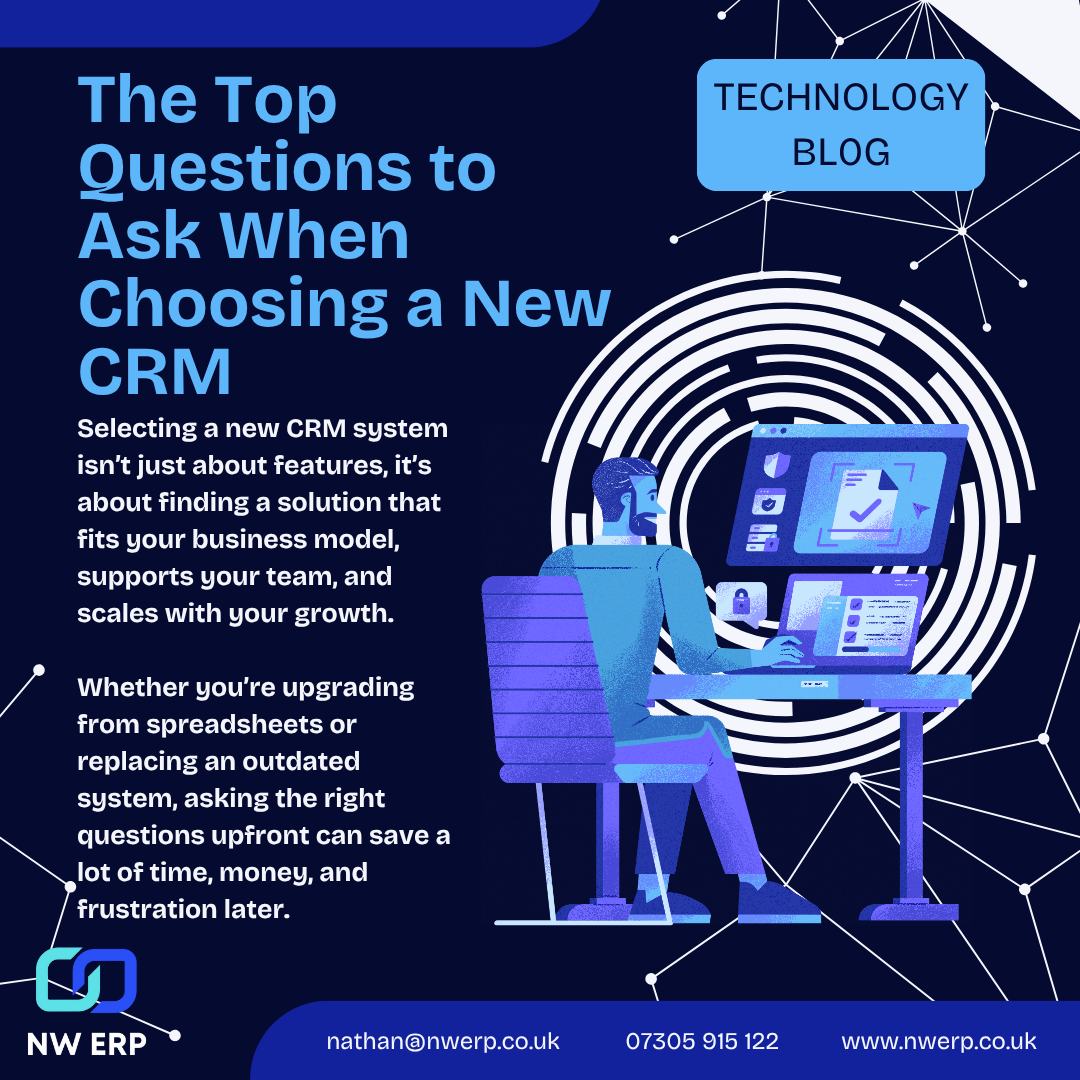 14 October, 2025
14 October, 2025
Selecting a new CRM system isn’t just about features, it’s about finding a solution that fits your business model, supports your team, and scales with your growth. Whether you’re upgrading from spreadsheets or replacing an outdated system, asking the right questions upfront can save a lot of time, money, and frustration later.
Here are the key questions every business should ask when evaluating a new CRM:
A CRM should be an investment, not a short-term fix. Consider whether the platform can handle increased users, data volume, and complexity as your business expands. Look for flexible pricing, modular add-ons, and a strong product roadmap.
Every business tracks information differently. Make sure you can tailor fields, deal stages, and reports to reflect your own sales or service process, not just the software vendor’s idea of one.
Your CRM should connect seamlessly with the tools you already use. Check for direct integrations with ERP systems, QuickBooks, Xero, Mailchimp, Shopify, or your marketing automation platform.
An open API allows you to connect custom applications or automate workflows. This is essential if you plan to integrate the CRM with internal systems, customer portals, or reporting dashboards.
Smooth communication is vital. Look for native connectors or plug-ins that automatically sync emails, calendar events, and messages between your CRM and collaboration tools.
A mobile CRM should do more than just show contact details; it should support tasks like logging calls, updating deals, and viewing key metrics from anywhere.
Data protection is critical. Ask about backup frequency, data storage locations, and recovery timelines in case of an outage. You want reassurance that your customer data is always safe and accessible.
Understand exactly how pricing works. Some CRMs charge per user, while others charge based on modules or data limits. This helps you avoid surprises later.
The base price is rarely the full cost. Ask about hidden or optional extras such as advanced reporting, custom fields, API usage, or premium support.
Even simple CRMs take time to configure, test, and train users. Get a clear idea of the total project scope, including onboarding fees and consultancy time.
If you’re confident in your choice, committing to an annual or multi-seat plan can often unlock significant savings.
Check what type of support you’ll receive post-implementation. 24/7 live chat or a dedicated account manager can make a big difference when issues arise.
Support quality varies widely between vendors. Ask for actual performance data, not just “we aim to respond within X hours.”
Regular updates show active development and product maturity. Cloud CRMs usually handle updates automatically, but it’s worth knowing how they’re tested and rolled out.
References and case studies reveal how the CRM performs in real-world scenarios. Focus on businesses similar to yours in size, sector, and complexity.
Some CRMs include templates or modules tailored for specific industries (e.g. distribution, retail, or manufacturing). This can reduce setup time and provide immediate value.
AI-driven insights, automated lead scoring, and predictive analytics are becoming standard. Ask vendors what’s planned for the next few years to ensure your investment stays ahead of the curve.
Don’t just compare monthly prices, calculate the total cost of ownership (TCO) over 3–5 years. Include licensing, integrations, setup, training, and ongoing support. The cheapest monthly plan often isn’t the best long-term value.
Choosing a CRM is a strategic decision that affects every part of your business. Take the time to ask these questions, compare options thoroughly, and think beyond the immediate needs of today. A well-chosen CRM will grow with your company, empower your team, and strengthen your customer relationships for years to come.
If you need help sourcing the right CRM, feel free to get in touch. We can help you evaluate options, compare features, and find the best fit for your business.
You can find more helpful tips here:
Have questions about optimising your business with ERP, SaaS, Ecommerce or automation? Looking for ways to cut costs, improve efficiency, or enhance customer service.
Contact us today to discuss your needs and discover how we can help your business thrive.
No Obligation – Just a friendly chat to explore possibilities.
